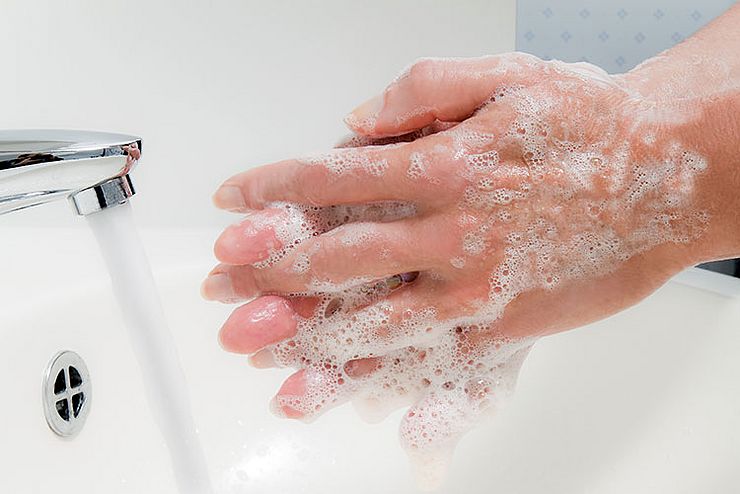Information on the Coronavirus COVID19
The Ministry of Health and Regional Health Directorate for Tyrol are closely monitoring current developments and are in constant contact with the responsible national and international authorities.
The disease: COVID-19 (coronavirus disease 2019 - the new name of the disease and pathogen were announced by WHO on 11.02.2020)
Pathogen: SARS-CoV-2
German
Italian
Contact
Coronavirus Hotline
Experts from the Austrian Agency for Health and Food Safety are on hand to answer questions about the Corona virus.
Telephone: 0800 555 621 – ( 7 days a week, 0 to 24 hours ) .
General information about the Coronavirus
What is COVID-19?
Corona viruses (CoV) form a large family of viruses that can cause mild colds to severe pneumonia in humans.
How does the virus spread?
According to information available to date, there is the possibility of person-to-person transmission by droplet or smear infection (touching contaminated surfaces). The risk of person-to-person transmission is relatively low and, according to current information, slightly higher than that of influenza. In comparison, measles viruses are 5-7 times easier to transmit.
How does the disease manifest itself?
Common signs of an infection with the new coronavirus include fever, sore throat, cough and breathing difficulties. In more severe cases, the infection can cause pneumonia, kidney failure and, especially if other serious diseases already exist, death. The mildest forms of the disease (symptoms of a cold) are most common.
How long is the incubation period?
It is currently assumed that the incubation period is usually 2-7 days (max. 1-14 days).
How long is the contagious period?
The duration of infectiousness is currently assumed to be from one day before the onset of the disease up to 2 days after the end of symptoms, but presumed to be at least 10 days, and therefore not yet fully known.
How is the disease treated?
Treatment is symptomatic, i.e. by alleviating the symptoms of the disease, such as antipyretic drugs. Vaccination is not available.
Who is at risk?
Predominantly at risk are those who have had close contact with a person suffering from a new type of coronavirus infection or have died (e.g. family members, medical staff, without appropriate protective equipment). Travellers from China who unknowingly came into contact with a person suffering from SARS-CoV-2 could be at risk of infection, although to a much lesser extent.
The risk of the disease being spread from affected regions to Austria is considered to be low.
Download additional information in German, English and Mandarin.
How can I protect myself - Information on hygiene measures
In the case of diseases spread by droplet transmission, pathogens are found in or on droplets which, due to their size and weight, are propelled a short distance to the ground (up to 2 metres), or adhere to surfaces after infected persons cough or sneeze. These pathogens land either directly on the host’s mucous membranes or are transferred by touching a contaminated surface. This is the transmission path for influenza, for example, or potentially for SRS-CoV-2, the new type of Coronavirus disease COVID-19.
How can I protect myself from air-droplet borne diseases?
- Keep your distance from people who are obviously ill and avoid all direct physical contact with them
- Do not shake hands
- Do not touch your face with unwashed hands, especially your eyes, nose and mouth
- Wash your hands regularly with soap and water for over 20 seconds, especially when you get home after spending time in public places (e.g. buses or train journeys), as well as before eating meals
- Avoid touching handles that other people have come into contact with
- Open doors with your elbow where possible
- Open windows for several minutes to ensure thorough ventilation
- Observe food hygiene in general, such as washing fruit and vegetables for a sufficiently long period, or heating sensitive foods such as meat, seafood or eggs to over 70 degrees.
- Ensure that food is sufficiently cooled and pay attention to cleanliness
Healthy lifestyle. What can I do to prevent infecting anyone, even if I only have a slight cold but am still on the move?
- Keep your distance from others - at least 2 m
- Wash your hands often with soap for over 20 seconds, especially after blowing your nose or sneezing, even if a disposable handkerchief is used, as well as after using the toilet and before preparing food
- Used disposable tissues should be thrown away immediately
- Cough or sneeze in the crook of your arm when no handkerchief is available and turn away from other people
- Do not shake hands
- Maintain social distance (e.g. don't go to parties, don't visit hospitals or nursing homes, don't kiss when greeting others)
- Wear a mask that prevents your own droplets from being expelled into the air
- In case of more severe symptoms of the disease, stay at home and keep separate from your family for the benefit of their health:
- Use your own towel
- Sleep separately
- If possible, eat separately too
- No physical contact
- Maintain a distance of at least 2 metres from people you are engaging in conversation with
- Do not share dinnerware with anyone
- Keep the bathroom and toilet clean with commercially available cleaning agents
- Cleaning cloths should be hung out to dry and changed frequently
- Wash cutlery and clothing at 60 degrees in a long wash cycle
- Only use disinfectants in the case of a highly contagious infection to interrupt the chain of infection.
- They are seldom necessary, as standard household cleaners are usually sufficient.









